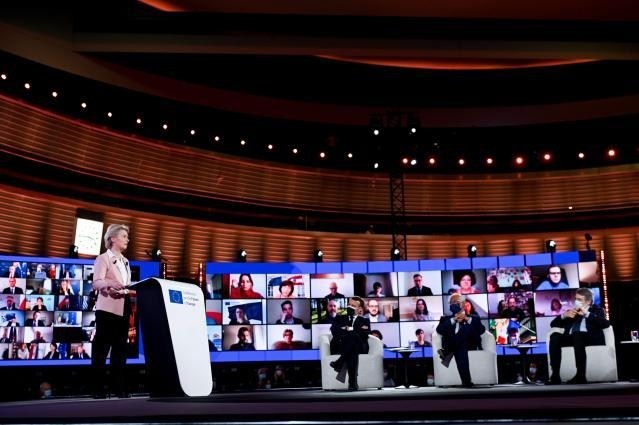Given what is at stake, the Conference on the Future of Europe’s opening event in the beautiful hemicycle of the Strasbourg Parliament had a rather subdued and eerie feel about it, as if infused with the solemnity of a wake or the sobriety of a corporate annual general meeting.
And yet if the Conference is to mobilise the hopes, dreams and aspirations of the people of Europe, there needs to be a moment when it springs into life, a moment when the citizens of Europe feel the uplifting energy and potential of an effervescent democratic awakening.
The launch day, Europe Day, 9 May was a Sunday this year, further adding to the church-like atmosphere. Everyone was very polite and seemed much in agreement. This begs the question of what still needed to be discussed and debated with the citizens.
The 500 citizens peering out from screens around the hemicycle brought the Salone dei Cinquecento to mind in the Palazzo Vecchio in Florence, whose walls were once adorned with medieval battle scenes by Leonardo and Michelangelo.
Today’s backdrop is the global pandemic, and the need for the EU to find a clear pathway to the future in the aftermath of COVID 19 and the car crash that is Brexit. The pandemic has taken our breathe away in more ways than one. Not only has it cost the lives of hundreds of thousands of Europeans, it has also taken away jobs and livelihoods.
In some EU member states, the pandemic has also coincided with democratic backsliding, including measures to curb freedom of assembly and which undermine the rule of law.
In Poland, the Constitutional Court has just removed the mandate of the Polish Ombudsman, Adam Bodnar for daring to stand up for the rule of law in Poland, including bringing a number of local governments to court for their introduction of LGBT+ free zones.
Even in Denmark and France draconian laws are being introduced to clamp down on the freedom to protest. Hungary is a case apart with its embrace of “illiberal democracy”.
At the same time as showing up Europe’s weaknesses, the pandemic has also brought out Europe’s strengths, and above all reminded us of the value of solidarity as the foundation of the European social and democratic model.
This year, Europe Day, 9 May, also coincided with the 100th anniversary of the birth of Sophie Scholl, a German student and anti-Nazi political activist who was executed by the Nazi regime in 1943. If she was still alive today, Sophie Scholl would doubtless have welcomed the fact that so many of today’s young people have so much to offer the future of Europe.
Just look for example at the plethora of European Citizens Initiatives fizzing with energy and enthusiasm for changing Europe from below. Initiatives calling for the introduction of a carbon tax for example (Stop Global Warming) or a Universal Basic Income, or the right for EU citizens to vote wherever they live and work in Europe (Voter Without Borders).
At the same time, Sophie Scholl would see that there are still too many who prefer a quiet life to the challenge of making their voices heard. Even in a Europe where standing up for human rights, democracy, and human rights is not likely to lead arrest and execution.
Ignorance of European Citizens’ Initiative
A YouGov survey commissioned by the citizens movement Eumans, and backed by New Europeans, the Citizens Take Over Europe coalition and other civil society groups, has found that there is an alarming lack of knowledge amongst the European public about what one key instrument of direct citizen participation, the European Citizens’ Initiative (ECI), actually is.
In Germany, for example, only 1.4% of those asked, know what an ECI was and how it works. In Finland the figure was only slightly higher at 1.5% with the Portuguese coming in first on the survey, but still with a very low figure of 4.1%.
The ECI entered into force already in 2012 as an instrument for participatory democracy to enable citizens to propose new EU legislation. It requires a minimum of at least 1 million signatures from at least seven EU member states. After a hearing in the European Parliament, the Commission has three months to reply in the form of a communication whether it will follow up with a legislative proposal.
The survey was commissioned because the EU institutions were thought to have a misplaced confidence in the public’s understanding of ECIs not to mention other instruments of direct citizen participation in Europe. EU leaders may also be over-estimating the extent to which citizens will be willing to embrace and participate in the Conference on the Future of Europe.
Those who advocate the need for more citizen involvement in politics are not necessarily calling for this at the expense of more conventional forms of representation. In fact, increasing direct citizens’ consultations while at the same time strengthening the role of representative institutions is the key to the democratic revival of Europe.
What can happen in the United States can also catch on in Europe. Democracy is fragile. The EU Institutions cannot survive for long without the oxygen of democratic participation. There are also those who fear that the COVID pandemic will see the dismantling of social rights in Europe driven by lack of funds.
Piotr Sadwoski, President of Social Platform, the largest network of civil society organisations advocating for a social Europe told the EU Council Social Summit in Porto: “There should be a European social model where everyone is included, respected, treated as a human being and not discriminated against.”
The battle to defend European solidarity, as well as to prevent further erosion of our rights as citizens and non-citizens alike, has begun in earnest.
On one of the leaflets, Sophie Scholl and her fellow activists had written this: “Only through European cooperation, can the ground be created on which a new construction will be possible: freedom of speech, freedom of confession, protection of individual citizens from the will of criminal violent states, these are the foundations of a new Europe.”
These words don’t just remind us of Europe’s past – they continue to light up the path to Europe’s future.
By Roger Casale


